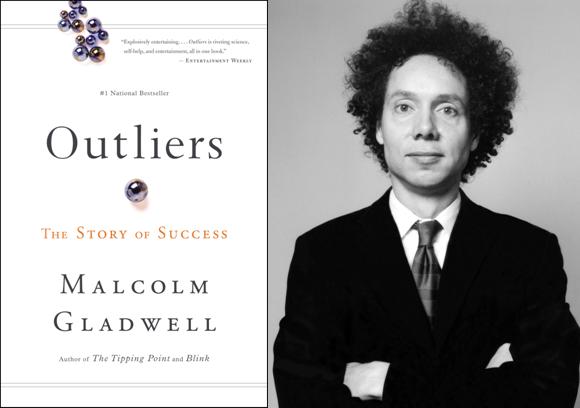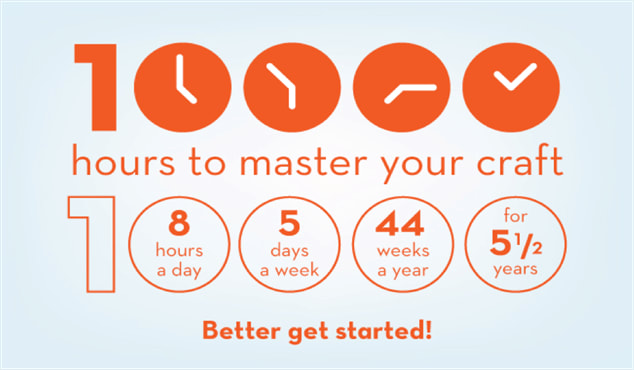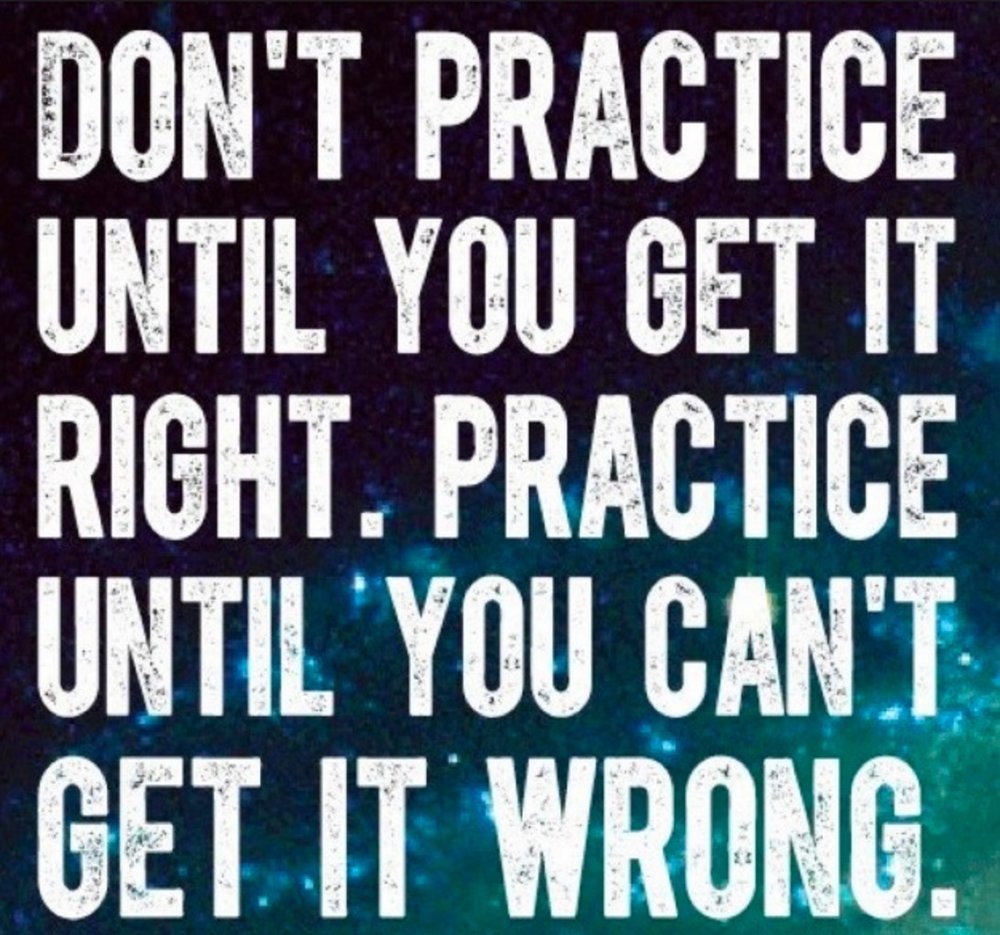|
This is my fourth year and my 111th attempt to make my KNOWvember challenge happen. I have interviewed a lot of people, researched a lot of places, and learned about a lot of things. One might say I have spent way too much time on this weird little social experiment of mine, with not a lot to show for it - other than 111 posts and higher blood pressure. You'd think by now, I would have learned my lesson. Or at least improved my grammar or creative writing style. According to Malcolm Gladwell, I am still many years away from mastering this. In 2008, this Canadian journalist published his third book entitled, Outliers: The Story of Success. In it, Gladwell examines all the different factors that contribute to a person’s high level of success. One idea he repeatedly mentions is the "10,000-Hour Rule," which posits "the key to success and expertise in any skill, is, to a large extent, a matter of practicing the correct way, for a total of around 10,000 hours." This was not his original thought. The 10,000 hour rule has been around since the ‘70s. And it has been challenged ever since. As many would argue, this theory of self-improvement well...depends on a lot of other things. In an article he wrote in 2013 for the New Yorker Gladwell revisits his thesis stating, “No one succeeds at a high level without innate talent, I wrote: “achievement is talent plus preparation.” But the ten-thousand-hour research reminds us that "the closer psychologists look at the careers of the gifted, the smaller the role innate talent seems to play and the bigger the role preparation seems to play." In cognitively demanding fields, there are no naturals. Nobody walks into an operating room, straight out of a surgical rotation, and does world-class neurosurgery. And second—and more crucially for the theme of Outliers—the amount of practice necessary for exceptional performance is so extensive that people who end up on top need help.” Despite the fact that many people have debunked this rule for many different reasons, Gladwell still stands by this "magic number of greatness.” He cites all sorts of fun examples from a wide range of people who have achieved “world-class success.” Given his constant inquisitive mind, Gladwell wanted to find out the key of how these people got there. For example, why are the majority of Canadian ice hockey players born in the first few months of the calendar year? How did Microsoft co-founder Bill Gates achieved his extreme wealth? Or how did the Beatles became one of the most successful musical acts in human history and so on.
K. Anders Ericsson, whose research is the basis for Gladwell’s thesis, clarifies that the most important distinction between what Gladwell popularized and what Ericsson's research showed is that it's not about the number of hours of practice, it's about deliberate practice. "That's a kind of practice where you're not actually doing your job, you're actually taking time where you're focusing in on trying to improve," Ericsson says. Candice Elliott argued, “The 10,000-hour rule is not really about the number of hours you put into something; it’s about deliberate practice. If you want to become great at anything, it matters more how you practice than how much you practice.” Ericsson calls this a deliberate mindset, or to have a passion to learn that makes you really focus intently and deliberately on getting better. Let’s go back to me practicing guitar for 20 hours a week (which I will volunteer to do for the sake and authenticity of this article). Deliberate practice is practice with the intent to improve after each round. It more about “how” you practice instead of “how much.”
I bought my first guitar, a 1956 Gretsch Electromatic, from a shop on Sunset Blvd around the corner from my house in Hollywood. I was 30. After spending years hanging out with musicians, I figured it was time to learn. I found a guitar teacher, who at my very first lesson said this, “I can teach you to play guitar. Or I can to you play guitar.” Because you didn’t hear the inflection in his voice, or see him nod and tilt his head forward as he raised and lowered his eyebrows, let me explain what he meant.
He knew that he could teach me how to play with my head, learning scales and runs and tricks that I could build upon. Over time, if I practiced and put in my 10,000 hours, there would be a very good chance I would be a master guitar player. But, he wanted to let me that that he could also teach me how to play guitar that came from the heart and gut, that expressed emotion and soul. You know, like Hendrix. Since I wanted to learn fast, and didn’t have 10,000 hours to get there, I chose the latter. As Ericsson points out, on top of how long I practice, and how I practice, who teaches me what to practice is equally important. He writes, "In particular, when you do that under the guidance of a master teacher, so the teacher would be able to actually tell you what is going to be the next step here in your development. That is the kind of practice that we talked about as being essential to reach the highest level of performance." I had a neighbor who is a very famous bass player, like super famous. If you know bass players then you would know him. He has mastered the technical, and even invented a few tricks of his own that have become his signature. He has recorded and toured with other skilled and master musicians for close to four decades. He knows how to “play” guitar. But he also understands how to “play” guitar. One day, while my kids and I were washing the car in the alleyway, he stopped and ask the kids how much would they charge him to wash his car? They shouted out all sorts of answers. But I said, “I’ll wash and detail your car for bass lessons. And this was his response (I kid you not). “Deal. Lesson one. Stop playing the bass. I’ve heard you play and you suck.” I will add that it was all said in good humor and we all had a great laugh. But as he drove away with his dirty car, I knew in my heart he was right. I hadn’t given the bass 100 hours, muchless 10,000. Gladwell argues are no prodigies and people with special gifts in this world. “Research suggests that once a musician has enough ability to get into a top music school, the thing that distinguishes one performer from another is how hard he or she works. That’s it.” Since so many people have worked so hard to debunk Gladwell’s argument, maybe the rule should be amended to say, 50,000 hours. At least that will give me an excuse to play guitar a little while longer. But if I am busy playing I won't be writing. And if I'm not writing then I'm not improving. It's a vicious cycle. But at least this one has guitars https://www.edsurge.com/news/2020-05-05-researcher-behind-10-000-hour-rule-says-good-teaching-matters-not-just-practice https://howigotjob.com/articles/how-long-is-10000-hours/ https://www.listenmoneymatters.com/the-10000-hour-rule/
0 Comments
Leave a Reply. |
Ian MacdonaldAn ex-copywriter turned punk rock pastor and peacemaker who dedicates his life to making the world a better place for all humanity. "that they all might be one" ~John 17:21“Prius vita quam doctrina.”
~ St. Thomas Aquinas (1225–1274) * “Life is more important than doctrine.”
Archives
June 2024
|



